It’s no secret that marketing automation is a highly effective way to increase your revenue and provide a consistent experience for all of your visitors and customers.
From automatically welcoming new subscribers and sending personalized offers, to moving prospects through your sales pipeline, automation keeps everything ticking over without your active focus every day.
The challenge is that there are so many marketing automation software options to choose from, it can be hard to know which one to use. Worse, they aren’t all equal—they vary in usability, features, customer support, and price.
To make the decision simpler, we tested 11 top marketing automation platforms as rated on G2, and this article shares what we found.
Here’s what we’ll cover:
- How to pick the best marketing automation software
- List of top marketing automation tools
Marketing automation software: How to pick
There are several factors to take into account to ensure you choose the best option for your business:
- Your budget—many tools can be expensive, with some costing upwards of $100,000 a year.
- Ease of use—you can get a sense of this by looking at tutorials and user reviews.
- Purpose—it’s important to know in advance which processes you want to automate, such as email, sales, or customer support, as some tools may be better suited to specific tasks.
- Whether you’re a for-profit or nonprofit organization—some software has non-profit configurations and features built-in.
- Try before you buy—if available, using a free demo of the software before committing to it means you can ensure that it meets your specific needs.
The best marketing automation software
In this article, we’ll be looking at the following platforms:
- Omnisend — Best automation features for ecommerce businesses
- Hubspot — For CRM automation (sales, service, and marketing)
- Marketo Engage — For enterprise-level automation
- Drip — For B2B startup marketing
- CoSchedule — For social media marketing automation
- Sendinblue — For getting started with email automation
- Keap — For mid-sized businesses
- Braze — Made for large companies to engage more customers
- Engagebay — For sales and support
- Activecampaign — For small businesses
- Salesforce — For enterprises and nonprofits
1. Omnisend — Best for ecommerce businesses
Rating from users (G2): 4.6/5
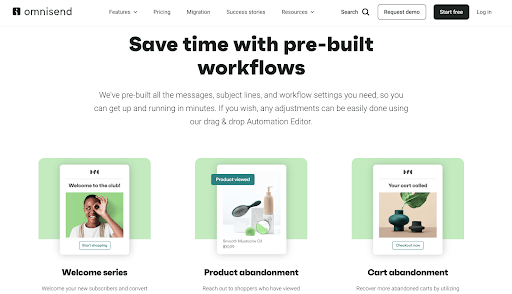
If you’ve heard the myth that email marketing has to be expensive, you’ll want to pay attention to Omnisend. It’s 40% cheaper than the leading email service provider, and even its free plan has the same features that you’ll find on the paid plans. Omnisend provides a range of features specifically designed to support online retailers, including email, SMS, and push marketing, as well as automated workflows to help you make sales on autopilot.
Omnisend integrates with a wide range of ecommerce platforms, including WooCommerce and Shopify, making it easy for businesses to automate their marketing processes and improve their customer engagement.
Omnisend has great reviews and delivers strong results—including driving 40% of all company sales for one merchant.
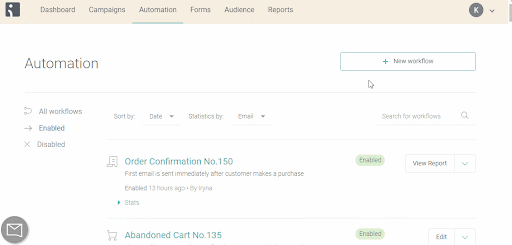
What you can do with it:
- Send irresistible birthday emails
- Win back shoppers with abandoned cart offers
- Keep your customers engaged after they’ve purchased
- Send different welcome emails for different signup forms
- Reactivate your dormant customers
Cons:
You’re limited to 250 contacts on the Free plan, which means it’s best if you’re just starting out, or you are testing Omnisend with a small segment of your email list. On the other hand, however, all features are unlimited on the Free plan, so you can try it out to its fullest, and you get 24/7/365 live chat and email support.
Who should use this marketing automation software:
If you run an online store and are looking for an effective way to automate your marketing efforts, Omnisend may be an excellent option for you.
Pricing:
- Free: all features included
- Standard: from $16 per month
- Pro: from $59 per month
👉See full pricing and features
Reternity, a Shopify store, generates 2600% higher revenue-per-email (RPE) than regular one-off emails thanks to automation.
Read the full details in the Reternity marketing automation case study
2. Hubspot — For CRM automation (sales, service, and marketing)
Rating from users (G2): 4.4/5

Hubspot’s marketing automation tool is designed to help businesses grow by streamlining their marketing and sales processes.
Hubspot’s features and integrations make it easy for businesses to create targeted, personalized experiences for their customers and track and measure their performance.
What you can do with it:
- Omnichannel marketing automation
- A/B testing
- Whitelabeling options
- Visual editor allows you to customize workflows
- Access phone and email support
Cons:
Although Hubspot offers a range of pre-built templates and tools to help businesses create and execute marketing campaigns, as well as a strong CRM for contact management, its customization options can be limited, especially for businesses that require more advanced or unique marketing solutions.
Who should use this marketing automation tool:
Hubspot is suitable for businesses of all sizes, but it is particularly well-suited for mid to large-sized companies that require a more comprehensive and scalable marketing automation solution, and have a larger budget.
Pricing:
- Starter: Starts at $45 per month for up to 1000 contacts
- Professional: Starts at $800 per month for up to 2000 contacts
- Enterprise: Starts at $3,600 per month for up to 10,000 contacts
3. Marketo Engage — Best for enterprise-level automation
Rating from users (G2): 4.1/5
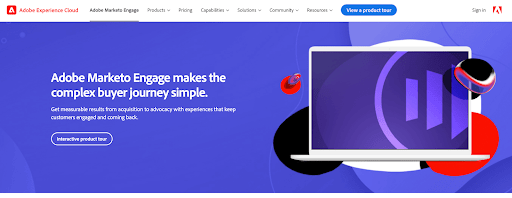
Marketo Engage offers a range of features for lead management, lead nurturing, email marketing, and analytics. Its advanced features, such as lead scoring and lead prioritization, make it a top choice for large businesses looking to streamline their lead generation and conversion processes.
What you can do with it:
- Launch quickly with Marketo automation
- Let AI build predictive audiences and segments
- Nurture leads and prospects across all channels
- Personalize experiences with active listening and triggered content
- Sync B2B audiences between Marketo Engage and Adobe Target
Cons:
Marketo Engage’s customer support can be limited, with some users reporting long wait times for help or assistance with technical issues. This can be a drawback for businesses that require a high level of support, especially in the early stages of setting up and using the platform.
Who should use this marketing automation tool:
Marketo Engage is best suited for large businesses and enterprises.
Pricing:
Pricing is customized to the requirements of the business and is not publicly available.
4. Drip — Best for startups
Rating from users (G2): 4.4/5
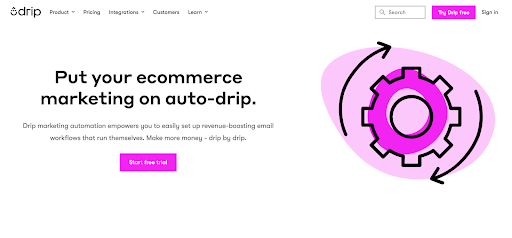
Drip provides a range of features for email marketing, lead nurturing, and analytics and focuses on e-commerce. Its simple and intuitive interface, combined with its ecommerce focus, makes it a top choice for B2B startups looking to grow their customer base quickly.
What you can do with it:
- Cart abandonment recovery
- Customer segments based on behavior and preferences
- Marketing analytics and reporting
- Personalized product recommendations
- Manage and track leads throughout the customer journey
Cons:
Users report that Drip’s customer support team is frequently backed up, and the lack of phone support can often make it difficult to get immediate resolutions.
Who should use this marketing automation tool:
Drip marketing automation software is designed for B2B startups and small businesses looking for a powerful and flexible platform for automating and optimizing their marketing operations.
Pricing:
- Prices start at $39 per month
5. CoSchedule — For social media marketing automation
Rating from users (G2): 4.5/5
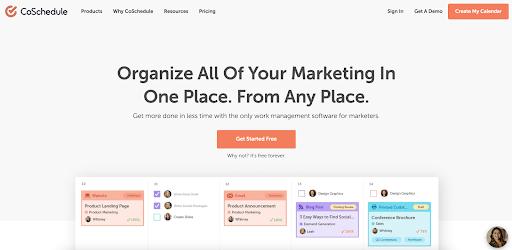
CoSchedule provides a range of features for automating and optimizing social media marketing, including scheduling, content creation, and analytics. Its focus on social media makes it a top choice for businesses looking to optimize their social presence.
What you can do with it:
- Eliminate content bottlenecks
- Maximize resources to increase output
- Catalog and maintain control of brand assets
- See every project on a unified calendar
- Boost ROI by attracting leads
Cons:
One of the main drawbacks of CoSchedule is that it may not be as feature-rich as some of its competitors, especially for more complex marketing operations.
Who should use this marketing automation tool:
CoSchedule is best suited for organizations looking to streamline their marketing operations and improve overall marketing performance, from a single solution.
Pricing:
- Marketing Calendar: Free
- Marketing Calendar Pro: $39 a month, or $29 when billed annually
- Marketing Suite: Bespoke pricing based on user requirements
6. Sendinblue — For getting started with email automation
Rating from users (G2): 4.5/5
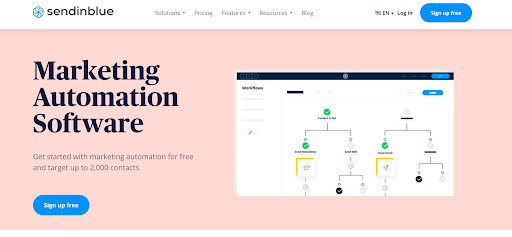
Sendinblue is a cloud-based marketing automation platform designed for businesses getting started with email automation. It provides a range of features for email marketing and SMS marketing and landing pages with a simple and intuitive interface.
What you can do with it:
- Email and SMS marketing
- Customizable email templates
- Drag-and-drop editor
- Get real-time data to monitor performance
- Craft welcome journeys for lasting relationships
Cons:
The limit of 300 emails a day on the Free plan means that Sendinblue may not be suitable for those with large email lists.
Who should use this marketing automation tool:
Sendinblue’s affordability and ease of use make it a top choice for small businesses looking to get started with email automation.
Pricing:
- Free
- Starter: Starts at $25 per month for 20,000 emails
- Business: Starts at $65 per month for 20,000 emails
- Enterprise: Custom plans starting from $1,000 per month
7. Keap — For mid-sized businesses
Rating from users (G2): 4.2/5
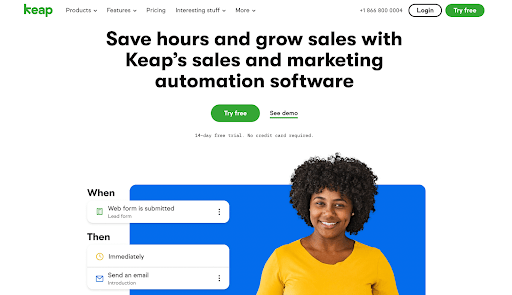
Keap (formerly Infusionsoft) provides a range of features for lead management, lead nurturing, email marketing, and analytics, focusing on mid-sized businesses.
What you can do with it:
- New lead capture
- Appointment reminders
- Sales nurture
- Purchase follow-up
- One-click upsell and cross-sell
Cons:
Text messaging is only available in the US, and phone services are only available in the US and Canada.
Who should use this marketing automation tool:
Keap’s affordable pricing and focus on small businesses make it a top choice for small to mid-sized businesses looking to streamline their customer engagement process.
Pricing:
- Pro: $149 month, billed annually
- Max: $199 month, billed annually
8. Braze — For large companies to engage more customers
Rating from users (G2): 4.5/5
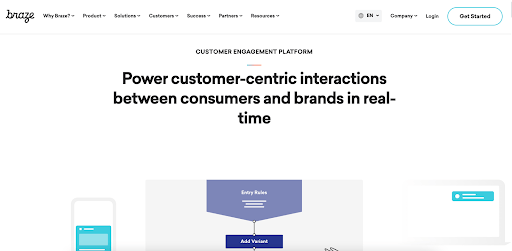
Braze provides large businesses with the tools to build, launch, and manage targeted, multi-channel marketing campaigns. Features include email marketing, push notifications, in-app messaging, and customer insights.
What you can do with it:
- Intuitive journey building
- Dynamic personalization
- Test and optimize messaging, frequency, and channels
- Intelligent timing and sending based on user behavior
- Data integration and sharing acceleration
Cons:
Because Blaze is designed for large businesses, they are higher cost than most on this list.
Who should use this marketing automation tool:
Large businesses that want to retain customers and convert them into repeat customers.
Pricing:
Pricing is unavailable without speaking to a sales advisor.
9. Engagebay — Best for sales and support
Rating from users (G2): 4.6/5
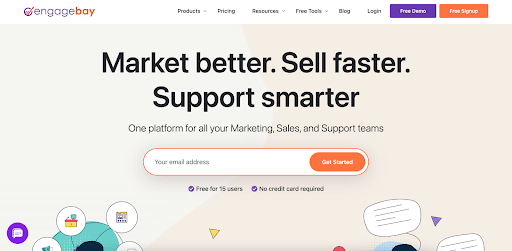
Engagebay’s platform is designed for sales and support. It provides a range of features for automating and optimizing lead generation, lead nurturing, sales, and support processes.
What you can do with it:
- Appointment scheduling
- Email and chat support
- Live chat
- Store unlimited contacts and build stronger relationships
- Send personalized messages to target audiences
Cons:
Users have reported that the training materials could be better, suggesting that the platform is not as intuitive as they would like.
Who should use this marketing automation tool:
Engagebay’s focus on sales and support makes it a top choice for businesses looking to streamline their customer engagement process.
Pricing:
- Free
- Basic: $14.99 per user per month
- Growth: $49.99 per user per month
- Pro: $99.99 per user per month
10. ActiveCampaign — Best for small businesses
Rating from users (G2): 4.6/5
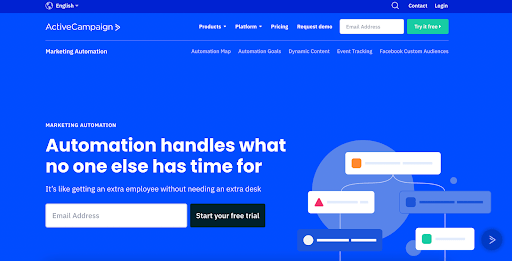
ActiveCampaign combines email marketing, automation, and CRM in a single platform, making it easy to manage customer interactions. With its user-friendly interface, businesses can create automated campaigns, manage their contacts, and monitor their performance with ease.
What you can do with it:
- Automatically send welcome emails to new contacts
- Trigger a reminder for important customer dates
- See your entire customer lifecycle in the automation map
- Integrate with the marketing tools you already use
- Track goal analytics and conversions
Cons:
The platform’s reporting and analytics capabilities are not as comprehensive as some other marketing automation tools, making it more challenging to measure the impact of your campaigns and make data-driven decisions.
Who should use this marketing automation tool:
ActiveCampaign is best suited for small businesses looking for an affordable and easy-to-use solution to automate their marketing processes.
Pricing:
- Lite: $29 per month, billed yearly
- Plus: $49 per month, billed yearly
- Professional: $149 per month, billed yearly
- Enterprise: Custom
11. Salesforce — Best for nonprofits
Rating from users (G2): 4.0/5

Salesforce offers robust features and capabilities to support large businesses and nonprofits. With its powerful analytics and reporting capabilities, businesses can measure the impact of their marketing campaigns and make data-driven decisions.
What you can do with it:
- Carry out A/B and multivariate testing
- Build workflows with their visual editor
- Monitor SEO keywords
- Identify your hottest leads
- Boost prospect engagement with AI
Cons:
The platform requires a significant investment in terms of time and resources to fully utilize its capabilities, making it challenging for businesses to get the most out of it without proper training and support.
Who should use this marketing automation tool:
Salesforce is designed for larger businesses that require a scalable and flexible solution to support their marketing efforts.
Pricing:
- Growth: Starts at $1,250 per month for up to 10,000 contacts
- Plus: Starts at $2,500 per month for up to 10,000 contacts
- Advanced: Starts at $4,000 per month for up to 10,000 contacts
- Premium: Starts at $15,000 per month for up to 75,000 contacts
How we chose these marketing automation solutions
The platforms in this article were chosen based on their reputation as well as G2 user reviews. Ultimately, the best marketing automation software for your business will depend on your specific needs, goals, and budget.
Before choosing a platform, it’s essential to carefully evaluate your requirements and research each option to ensure that the software meets your specific needs—both now and as you grow.
Source from Omnisend
Disclaimer: The information set forth above is provided by Omnisend independently of Alibaba.com. Alibaba.com makes no representation and warranties as to the quality and reliability of the seller and products.




